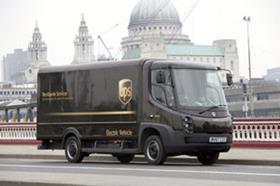More than 200 city logistics stakeholders headed to London’s Guildhall last week (21 June) to attend the final Frevue conference.
The EU project, led by the Cross River Partnership, has been running for four-and-a-half years to explore the viability of electric freight vehicles (EFVs) in urban environments.
Operators and public sector officials from eight major European cities have taken part in the project: Amsterdam, Lisbon, London, Madrid, Milan, Oslo, Rotterdam and Stockholm.
A range of 80-plus electric freight vehicles from car-derived vans up to 18-tonne trucks have been trialled in real-world operations, with data recorded over 757,000km.
Individual trials looked at everything from driver comfort through to battery performance and charging requirements for a multi-vehicle fleet.
https://www.youtube.com/watch?v=ypNA0Zl62xM
Key findings from the event include:
• EFVs are well suited to inner city operations;
• The range of EFVs on the market today is sufficient for most operations;
• Good driver acceptability and comfort to operate;
• Zero tailpipe emissions, with strong health benefits
• Significant cost savings for cities through reduced health and abatement costs
Some challenges still to be overcome, include:
• Limited vehicle supply, particularly at the larger end of the vehicle scale;
• For larger electric trucks, the business case is hard to make at present, although for small and medium EFVs they are already a cost-viable alternative to diesel. Larger trucks will continue to become more cost-effective as more players enter the market and battery technology is enhanced.

You can find case studies and useful guidance documents about all the city projects conducted through the programme on the Frevue website, as well as download all the slides and findings from the final conference.
Make sure to also sign the Frevue Declaration of Intent, which aims to provide solid proof to manufacturers of the desire from industry that demand exists for EFVs.
To date, more than 38 have been signed by organisations, representing 5,075 vans and 4,180 trucks.













